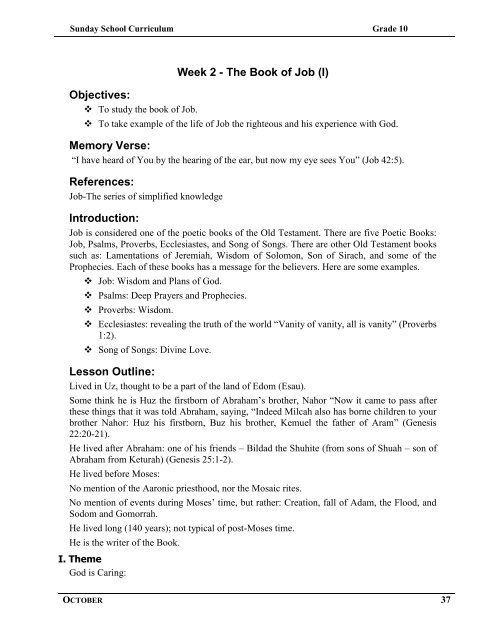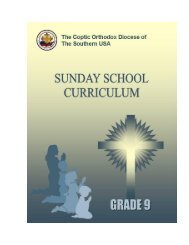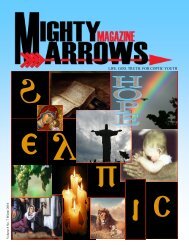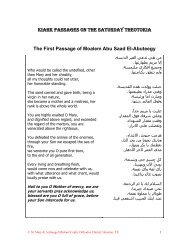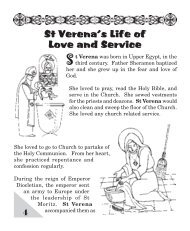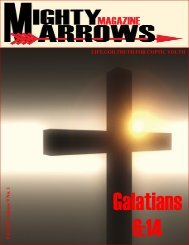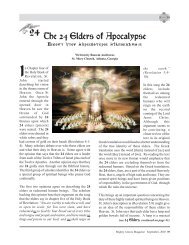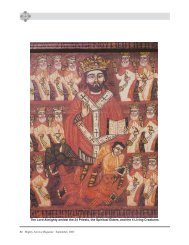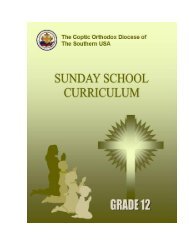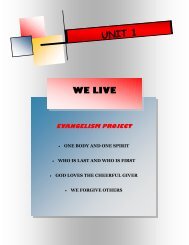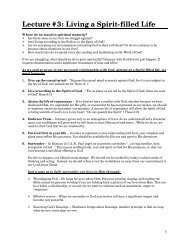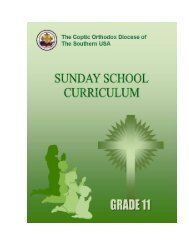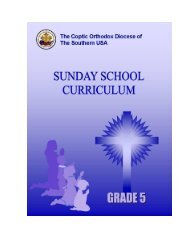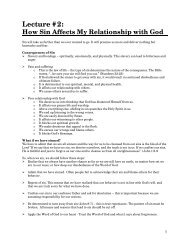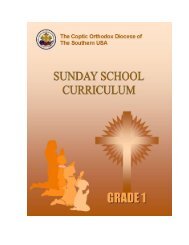Grade 10 - Coptic Orthodox Diocese of the Southern United States
Grade 10 - Coptic Orthodox Diocese of the Southern United States
Grade 10 - Coptic Orthodox Diocese of the Southern United States
Create successful ePaper yourself
Turn your PDF publications into a flip-book with our unique Google optimized e-Paper software.
Sunday School Curriculum <strong>Grade</strong> <strong>10</strong><br />
Objectives:<br />
To study <strong>the</strong> book <strong>of</strong> Job.<br />
Week 2 - The Book <strong>of</strong> Job (I)<br />
To take example <strong>of</strong> <strong>the</strong> life <strong>of</strong> Job <strong>the</strong> righteous and his experience with God.<br />
Memory Verse:<br />
―I have heard <strong>of</strong> You by <strong>the</strong> hearing <strong>of</strong> <strong>the</strong> ear, but now my eye sees You‖ (Job 42:5).<br />
References:<br />
Job-The series <strong>of</strong> simplified knowledge<br />
Introduction:<br />
Job is considered one <strong>of</strong> <strong>the</strong> poetic books <strong>of</strong> <strong>the</strong> Old Testament. There are five Poetic Books:<br />
Job, Psalms, Proverbs, Ecclesiastes, and Song <strong>of</strong> Songs. There are o<strong>the</strong>r Old Testament books<br />
such as: Lamentations <strong>of</strong> Jeremiah, Wisdom <strong>of</strong> Solomon, Son <strong>of</strong> Sirach, and some <strong>of</strong> <strong>the</strong><br />
Prophecies. Each <strong>of</strong> <strong>the</strong>se books has a message for <strong>the</strong> believers. Here are some examples.<br />
Job: Wisdom and Plans <strong>of</strong> God.<br />
Psalms: Deep Prayers and Prophecies.<br />
Proverbs: Wisdom.<br />
Ecclesiastes: revealing <strong>the</strong> truth <strong>of</strong> <strong>the</strong> world ―Vanity <strong>of</strong> vanity, all is vanity‖ (Proverbs<br />
1:2).<br />
Song <strong>of</strong> Songs: Divine Love.<br />
Lesson Outline:<br />
Lived in Uz, thought to be a part <strong>of</strong> <strong>the</strong> land <strong>of</strong> Edom (Esau).<br />
Some think he is Huz <strong>the</strong> firstborn <strong>of</strong> Abraham‘s bro<strong>the</strong>r, Nahor ―Now it came to pass after<br />
<strong>the</strong>se things that it was told Abraham, saying, ―Indeed Milcah also has borne children to your<br />
bro<strong>the</strong>r Nahor: Huz his firstborn, Buz his bro<strong>the</strong>r, Kemuel <strong>the</strong> fa<strong>the</strong>r <strong>of</strong> Aram‖ (Genesis<br />
22:20-21).<br />
He lived after Abraham: one <strong>of</strong> his friends – Bildad <strong>the</strong> Shuhite (from sons <strong>of</strong> Shuah – son <strong>of</strong><br />
Abraham from Keturah) (Genesis 25:1-2).<br />
He lived before Moses:<br />
No mention <strong>of</strong> <strong>the</strong> Aaronic priesthood, nor <strong>the</strong> Mosaic rites.<br />
No mention <strong>of</strong> events during Moses‘ time, but ra<strong>the</strong>r: Creation, fall <strong>of</strong> Adam, <strong>the</strong> Flood, and<br />
Sodom and Gomorrah.<br />
He lived long (140 years); not typical <strong>of</strong> post-Moses time.<br />
He is <strong>the</strong> writer <strong>of</strong> <strong>the</strong> Book.<br />
I. Theme<br />
God is Caring:<br />
OCTOBER 37


